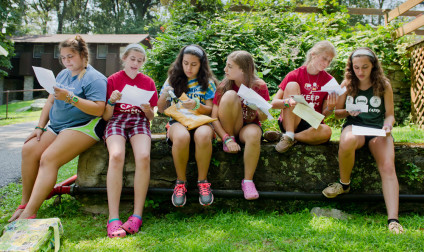7 Tips for Writing Letters to Your Camper
One of the best skills that camp teaches your child to do is to communicate offline. Your son and/or daughter spend weeks living in small spaces with peers and suddenly he or she is forced to express themselves without emojis. 🙂
Suddenly, you find yourself wondering how you’re going to get a full letter when your child only sends you one-word text responses to your questions. Below are 7 tips to get a worthy response for your digitally-savvy camper:
1. Give a positive update on the family.
 Try sharing small and happy news, such as the funny mistake Dad made when he tried grilling in the rain, or that Grandma finally has flowers blooming in her garden. However, be careful not to brag too much. Your child may get a serious case of FOMO (Fear of Missing Out), which leads to home-missing. If you ever need to share bad news, call us in the office. We will figure out the best way to tell your camper together.
Try sharing small and happy news, such as the funny mistake Dad made when he tried grilling in the rain, or that Grandma finally has flowers blooming in her garden. However, be careful not to brag too much. Your child may get a serious case of FOMO (Fear of Missing Out), which leads to home-missing. If you ever need to share bad news, call us in the office. We will figure out the best way to tell your camper together.
2. Ask one question.
Although you are eager for every morsel of information you can pull from your child, try to resist bombarding them with too many questions. Ask them one per letter. Try open-ended questions like “What was the best moment from today?” Also, the words “tell me about” encourage stories or longer answers than “the food is good.”
3. Include pictures with your letters.
Sometimes, it helps campers away from home for the first time to receive photos in the mail from their parents. Try sending one that will make them feel connected, but also not like they are missing out on anything. If you’re worried it will have that effect, encourage them to embrace feeling home-missing. It’s a normal feeling that every camper feels to some extent while at camp.
4. Share something you learned while your camper’s away.
Encourage your camper to try new things by modeling the same behavior many miles away. Tell your child about some new skills you’ve picked up or a craft that was a little outside your element (bonus parenting points if you make a craft and send it with your letter).
5. Avoid Guilt-Tripping for return mail.
You’ve probably spent hours thinking about what your camper was doing, how the bunkmates were getting along, what he/she was eating for lunch that day. And they are probably thinking about you as well. However, schedules are jam-packed in the day, especially the younger the camper is. Try to avoid using guilt to get your camper to write you back, but rather encourage it with “if you write me one letter, I’ll write you two.” There’s nothing wrong with mail-bribery, right? Bottom line is that if he/she isn’t writing you, it’s usually means your camper is too busy making friendships and memories that will last a lifetime.
6. Make a small puzzle in your letter.
Rearrange the letters of a word and give your camper the mission of finishing the letter, they’ll spend some time trying to reveal what meal you had for dinner or where you’ll be going on vacation to after camp. If it’s particularly difficult, your camper may ask bunkmates and counselors to help solve the puzzle. What a great way to encourage offline problem-solving skills in a subtle way.
7. Write at least once a week.
You may find that letter writing does not come easy to you. On the other hand, you might end up writing a letter every day. The rule of thumb is to send a letter each week. Encourage other family members to do the same. Remember that it takes a few days to travel.
Now that you are forced to communicate offline, your letters become some of the only physical artifacts of your relationship to your children. Cherish that communication and put some thought into writing a fantastic message. After all, you know what they say: There is no WiFi in the forest, but we promise you will find a better connection.

